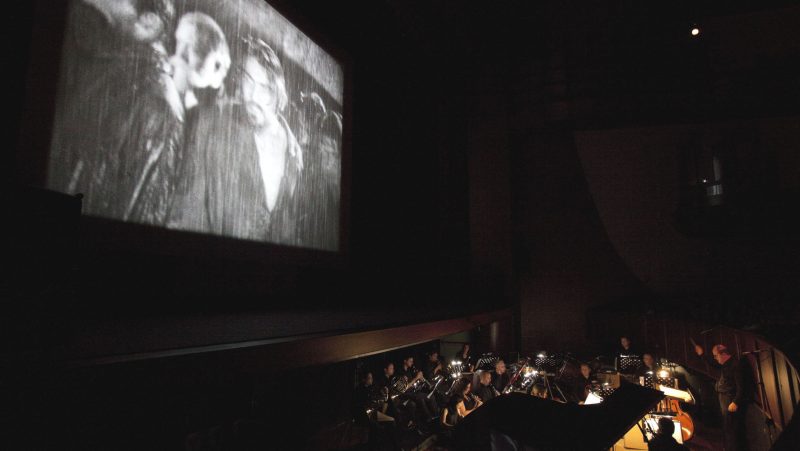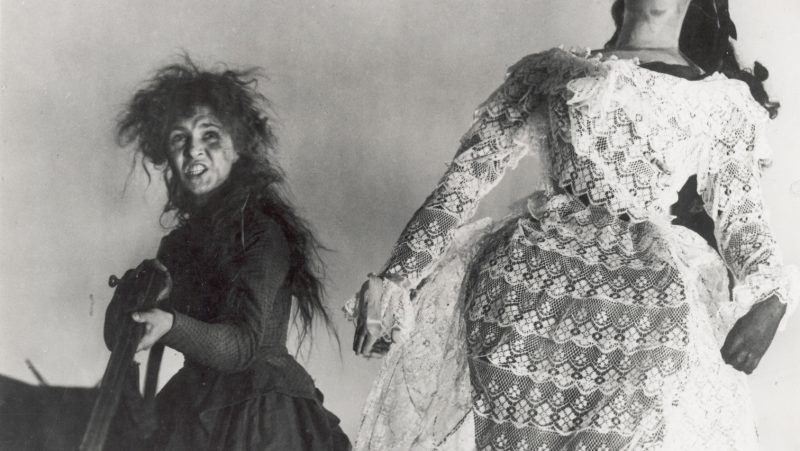A NEW ONLINE INITIATIVE
SHOWCASING MAJOR PRESENTATIONS FROM PAST EDITIONS
We’re calling it The Silent Stream: a new virtual space designed by the Pordenone Silent Film Festival to stream some of the major presentations we’ve showcased in past editions. No matter where you are, you’ll be able to re-live the excitement of the live event or experience it for the first time, knowing that the visual and audio quality will be the best possible. All this will be available in the lead up to future announcements regarding the programme for the 39th “limited edition” and its online incarnation from 3 to 10 October 2020.
The Silent Stream is accessible from our website, which for several weeks has also been hosting the blog La Gatta Muta; or, The Silent Cat, in which festival director Jay Weissberg takes readers on a journey back into forgotten stories and people from the silent era.
The first free streaming event, available for three months until 12 October, is the film that opened the festival’s 30th edition on 1 October 2011: Novyi Vavilon (New Babylon, 1929) directed by Grigori Kozintsev and Leonid Trauberg, a milestone of the Russian avant-garde boasting an original score by Dmitri Shostakovich in the “definitive” version revised by noted conductor/arranger Mark Fitz-Gerald and performed by the FVG Mitteleuropa Orchestra, under maestro Fitz-Gerald’s baton. One year later the Cineteca del Friuli released a DVD in recognition of this important screening, but a new digitalization made for streaming has significantly improved the visual quality.
Set in France at the time of the Paris Commune of 1871, New Babylon is a grand panorama of society and at the same time the story of the tormented love between Louise, shop girl at “La Nouvelle Babylone”, and the young soldier Jean (overwhelmed by events, the couple find themselves fighting on opposite sides). This was Shostakovich’s first truly cinematic score and it remains among the most ambitious and brilliant, wedded to the action via an “inseparable integration of music and image, a neo-operatic medium never paralleled, unique to this work”, as described by David Robinson in the festival catalogue.
The Silent Stream will be enriched and replenished in the coming weeks. The second title, available from the beginning of August, is Mario Bonnard’s I promessi sposi (1922), a major event from Pordenone’s 37th edition, co-produced with Piano FVG, which, thanks to the impetus of President Davide Fregona and Dory Deriu Frasson, commissioned a new score from Udine composer Valter Sivilotti that was performed with enormous success on 10 October 2018 at the Teatro Verdi by the Nuova Orchestra da Camera “Ferruccio Busoni” of Trieste in collaboration with the Accademia Naonis of Pordenone, under the direction of maestro Massimo Belli and with the participation of pianist Lorenzo Cossi (prize winner at the 2010 Piano FVG competition). The digital version of the restored copy provided by the Cineteca Italiana of Milan is the best currently available.
Next up will be the Scandinavian rural drama Morænen (1924) by A.W. Sandberg, a story of patriarchal oppression set in the frozen north. Det Danske Filminstitut, the Danish national film archive, brought the film to Pordenone in 2017, where the accompaniment by Stephen Horne on piano and accordion, and Elizabeth-Jane Baldry on harp, bewitched the audience who gave the musicians a standing ovation.
The Silent Stream will remain active even after October, presenting films and images from Pordenone’s storied past in a lead-up to the festival’s fast-approaching milestone: our 40th anniversary, to be celebrated in October 2021, once again reunited at the Teatro Verdi in Pordenone.
Credits:
1. Le Giornate del Cinema Muto 2011, opening event. NOVYI VAVILON (New Babylon, URSS 1929) by Grigori Kozintzev and Leonid Trauberg. Photo by Paolo Jacob.
2. Yelena Kuzmina (Louise) in NOVYI VAVILON (New Babylon, URSS 1929) by Grigori Kozintzev and Leonid Trauberg


 Italiano
Italiano

Recent Comments